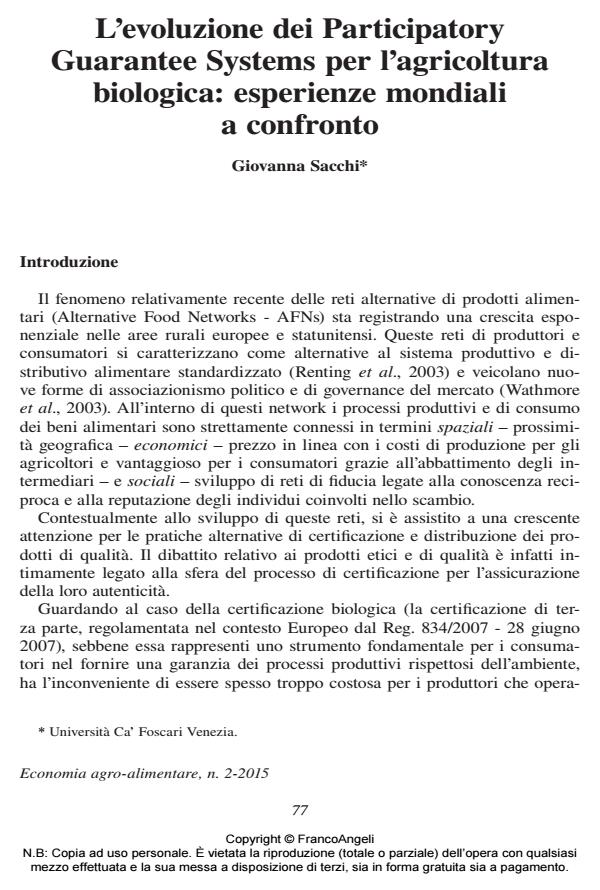L’evoluzione dei Participatory Guarantee Systems per l’agricoltura biologica: esperienze mondiali a confronto
Titolo Rivista ECONOMIA AGRO-ALIMENTARE
Autori/Curatori Giovanna Sacchi
Anno di pubblicazione 2015 Fascicolo 2015/2
Lingua Italiano Numero pagine 16 P. 77-92 Dimensione file 137 KB
DOI 10.3280/ECAG2015-002005
Il DOI è il codice a barre della proprietà intellettuale: per saperne di più
clicca qui
Qui sotto puoi vedere in anteprima la prima pagina di questo articolo.
Se questo articolo ti interessa, lo puoi acquistare (e scaricare in formato pdf) seguendo le facili indicazioni per acquistare il download credit. Acquista Download Credits per scaricare questo Articolo in formato PDF

FrancoAngeli è membro della Publishers International Linking Association, Inc (PILA)associazione indipendente e non profit per facilitare (attraverso i servizi tecnologici implementati da CrossRef.org) l’accesso degli studiosi ai contenuti digitali nelle pubblicazioni professionali e scientifiche
This paper highlights the importance and the emergence of Participatory Guarantee Systems (pgs) for quality assurance of organic products worldwide. The study provides an overview of several experiences of networks that have adopted pgs. As such, the paper represents a valuable instrument considering the different facets that these models have assumed over the years, in different countries and contexts, in response to different needs. The first network described is the Brazilian Rede Ecovida de Agroecologia. It is interesting to note that in this case the work and the products of the network are officially recognized within the national legislation. On the contrary, Certified Naturally Grown was founded from the need of diversification from the American National Organic Program. Finally, the Indian ngo Keystone Foundation, which promotes and stands for the protection of both cultivation and indigenous cultures. In Italy the CampiAperti association represents one of the best-organized network of producers and co-producers based on pgs principles. The Italian experience offers the chance to a widespread remark, also by Genuino Clandestino movement, on the need for policy adjustments to the variety of productive practices as well as looking at the several experiences of small processors. In this respect in Italy policymakers are starting to discuss a number of measures aimed at protecting family farmers and their production habits. For example, Regulation n. 19/2014 of Emilia Romagna Region recognizes and defends the application of solidarity economic activities. This regulation enhances the importance of peasant agriculture and its practices and it also recognizes the participatory guarantee as a model that ensures environmental and social sustainability and animal welfare as well as workers’ rights. Specific interest in this topic has also come up on the European agenda. In 2013 the EU launched an online public consultation on organic agriculture and the regulation of organic production. This survey contains some questions regarding EU citizens’ willingness to accept alternative certification schemes. Furthermore, in 2014 Horizon2020 published a call entitled Small farms but global markets: the role of small and family farms in food and nutrition security. This call recognizes the importance of the contribution of family farms, and in particular smallholder farms, to food and nutrition security. This is why, we have to encourage and develop the growing also at EU policy level for alternative safeguarding models for organic agriculture.
Parole chiave:Alternative food networks, alternative labelling systems for organic, participatory guarantee systems, organic regulation
Jel codes:O13, Q13, Q18
- Participatory Guarantee Systems: structure, benefits and reasons for participation – insights from the Italian case study of Campi Aperti Greta Winkler, Sonja Kaufmann, Nikolaus Hruschka, Christian R. Vogl, in Frontiers in Sustainable Food Systems 1388853/2024
DOI: 10.3389/fsufs.2024.1388853 - The availability, price, and marketing characteristics of organic foods and beverages: a comparative food environment assessment Alexandra Sadler, Yandrapu Bharath, Jacqueline Tereza da Silva, Daniel Carneiro de Abreu, Emily Shankar, Karolyne Vieira Bassetto, Lindsay Jaacks, in Frontiers in Sustainable Food Systems 1670638/2025
DOI: 10.3389/fsufs.2025.1670638 - Social innovation matters: The adoption of participatory guarantee systems within Italian alternative agri‐food networks Giovanna Sacchi, in Strategic Change /2019 pp.241
DOI: 10.1002/jsc.2265
Giovanna Sacchi, L’evoluzione dei Participatory Guarantee Systems per l’agricoltura biologica: esperienze mondiali a confronto in "ECONOMIA AGRO-ALIMENTARE" 2/2015, pp 77-92, DOI: 10.3280/ECAG2015-002005